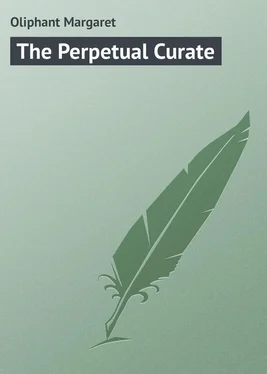Margaret Oliphant - The Perpetual Curate
Здесь есть возможность читать онлайн «Margaret Oliphant - The Perpetual Curate» — ознакомительный отрывок электронной книги совершенно бесплатно, а после прочтения отрывка купить полную версию. В некоторых случаях можно слушать аудио, скачать через торрент в формате fb2 и присутствует краткое содержание. Жанр: foreign_prose, foreign_language, на английском языке. Описание произведения, (предисловие) а так же отзывы посетителей доступны на портале библиотеки ЛибКат.
- Название:The Perpetual Curate
- Автор:
- Жанр:
- Год:неизвестен
- ISBN:нет данных
- Рейтинг книги:5 / 5. Голосов: 1
-
Избранное:Добавить в избранное
- Отзывы:
-
Ваша оценка:
- 100
- 1
- 2
- 3
- 4
- 5
The Perpetual Curate: краткое содержание, описание и аннотация
Предлагаем к чтению аннотацию, описание, краткое содержание или предисловие (зависит от того, что написал сам автор книги «The Perpetual Curate»). Если вы не нашли необходимую информацию о книге — напишите в комментариях, мы постараемся отыскать её.
The Perpetual Curate — читать онлайн ознакомительный отрывок
Ниже представлен текст книги, разбитый по страницам. Система сохранения места последней прочитанной страницы, позволяет с удобством читать онлайн бесплатно книгу «The Perpetual Curate», без необходимости каждый раз заново искать на чём Вы остановились. Поставьте закладку, и сможете в любой момент перейти на страницу, на которой закончили чтение.
Интервал:
Закладка:
Oliphant Mrs. Margaret
The Perpetual Curate
CHAPTER I
Carlingford is, as is well known, essentially a quiet place. There is no trade in the town, properly so called. To be sure, there are two or three small counting-houses at the other end of George Street, in that ambitious pile called Gresham Chambers; but the owners of these places of business live, as a general rule, in villas, either detached or semi-detached, in the North-end, the new quarter, which, as everybody knows, is a region totally unrepresented in society. In Carlingford proper there is no trade, no manufactures, no anything in particular, except very pleasant parties and a superior class of people – a very superior class of people, indeed, to anything one expects to meet with in a country town, which is not even a county town, nor the seat of any particular interest. It is the boast of the place that it has no particular interest – not even a public school: for no reason in the world but because they like it, have so many nice people collected together in those pretty houses in Grange Lane – which is, of course, a very much higher tribute to the town than if any special inducement had led them there. But in every community some centre of life is necessary. This point, round which everything circles, is, in Carlingford, found in the clergy. They are the administrators of the commonwealth, the only people who have defined and compulsory duties to give a sharp outline to life. Somehow this touch of necessity and business seems needful even in the most refined society: a man who is obliged to be somewhere at a certain hour, to do something at a certain time, and whose public duties are not volunteer proceedings, but indispensable work, has a certain position of command among a leisurely and unoccupied community, not to say that it is a public boon to have some one whom everybody knows and can talk of. The minister in Salem Chapel was everything in his little world. That respectable connection would not have hung together half so closely but for this perpetual subject of discussion, criticism, and patronage; and, to compare great things with small, society in Carlingford recognised in some degree the same human want. An enterprising or non-enterprising rector made all the difference in the world in Grange Lane; and in the absence of a rector that counted for anything (and poor Mr Proctor was of no earthly use, as everybody knows), it followed, as a natural consequence, that a great deal of the interest and influence of the position fell into the hands of the Curate of St Roque's.
But that position was one full of difficulties, as any one acquainted with the real state of affairs must see in a moment. Mr Wentworth's circumstances were, on the whole, as delicate and critical as can be imagined, both as respected his standing in Carlingford and the place he held in his own family – not to speak of certain other personal matters which were still more troublesome and vexatious. These last of course were of his own bringing on; for if a young man chooses to fall in love when he has next to nothing to live upon, trouble is sure to follow. He had quite enough on his hands otherwise without that crowning complication. When Mr Wentworth first came to Carlingford, it was in the days of Mr Bury, the Evangelical rector – his last days, when he had no longer his old vigour, and was very glad of "assistance," as he said, in his public and parish work. Mr Bury had a friendship of old standing with the Miss Wentworths of Skelmersdale, Mr Francis Wentworth's aunts; and it was a long time before the old Rector's eyes were opened to the astounding fact, that the nephew of these precious and chosen women held "views" of the most dangerous complexion, and indeed was as near Rome as a strong and lofty conviction of the really superior catholicity of the Anglican Church would permit him to be. Before he found this out, Mr Bury, who had unlimited confidence in preaching and improving talk, had done all he could to get the young man to "work," as the good Rector called it, and had voluntarily placed all that difficult district about the canal under the charge of the Curate of St Roque's. It is said that the horror with which, after having just written to Miss Leonora Wentworth to inform her what "a great work" his young friend was doing among the bargemen, Mr Bury was seized upon entering St Roque's itself for the first time after the consecration, when the young priest had arranged everything his own way, had a very bad effect on his health, and hastened his end. And it is indeed a fact that he died soon after, before he had time to issue the interdict he intended against Mr Wentworth's further exertions in the parish of Carlingford. Then came Mr Proctor, who came into the town as if he had dropped from the skies, and knew no more about managing a parish than a baby; and under his exceptional incumbency Mr Wentworth became more than ever necessary to the peace of the community. Now a new régime had been inaugurated. Mr Morgan, a man whom Miss Wodehouse described as "in the prime of life," newly married, with a wife also in the prime of life, who had waited for him ten years, and all that time had been under training for her future duties – two fresh, new, active, clergymanly intellects, entirely open to the affairs of the town, and intent upon general reformation and sound management – had just come into possession. The new Rector was making a great stir all about him, as was natural to a new man; and it seemed, on the whole, a highly doubtful business whether he and Mr Wentworth would find Carlingford big enough to hold them both.
"We could not have expected to begin quite without difficulties," said Mrs Morgan, as she and her husband discussed the question in the drawing-room of the Rectory. It was a pretty drawing-room, though Mr Proctor's taste was not quite in accordance with the principles of the new incumbent's wife: however, as the furniture was all new, and as the former rector had no further need for it, it was of course, much the best and most economical arrangement to take it as it stood – though the bouquets on the carpet were a grievance which nothing but her high Christian principles could have carried Mrs Morgan through. She looked round as she spoke, and gave an almost imperceptible shake of her head: she, too, had her share of disagreeables. "It would not look like Christ's work, dear," said the clergyman's wife, "if we had it all our own way."
"My dear, I hope I am actuated by higher motives than a desire to have it all my own way," said the Rector. "I always felt sure that Proctor would make a mess of any parish he took in hand, but I did not imagine he would have left it to anybody who pleased to work it. You may imagine what my feelings were to-day, when I came upon a kind of impromptu chapel in that wretched district near the canal. I thought it a Little Bethel, you know, of course; but instead of that, I find young Wentworth goes there Wednesdays and Fridays to do duty, and that there is service on Sunday evening, and I can't tell what besides. It may be done from a good motive – but such a disregard of all constituted authority," said the Rector, with involuntary vehemence, "can never, in my opinion, be attended by good results."
"Mr Wentworth, did you say?" said Mrs Morgan, upon whose female soul the Perpetual Curate's good looks and good manners had not been without a certain softening effect. "I am so sorry. I don't wonder you are vexed; but don't you think there must be some mistake, William? Mr Wentworth is so gentlemanly and nice – and of very good family, too. I don't think he would choose to set himself in opposition to the Rector. I think there must be some mistake."
"It's a very aggravating mistake, at all events," said Mr Morgan, rising and going to the window.
Читать дальшеИнтервал:
Закладка:
Похожие книги на «The Perpetual Curate»
Представляем Вашему вниманию похожие книги на «The Perpetual Curate» списком для выбора. Мы отобрали схожую по названию и смыслу литературу в надежде предоставить читателям больше вариантов отыскать новые, интересные, ещё непрочитанные произведения.
Обсуждение, отзывы о книге «The Perpetual Curate» и просто собственные мнения читателей. Оставьте ваши комментарии, напишите, что Вы думаете о произведении, его смысле или главных героях. Укажите что конкретно понравилось, а что нет, и почему Вы так считаете.












